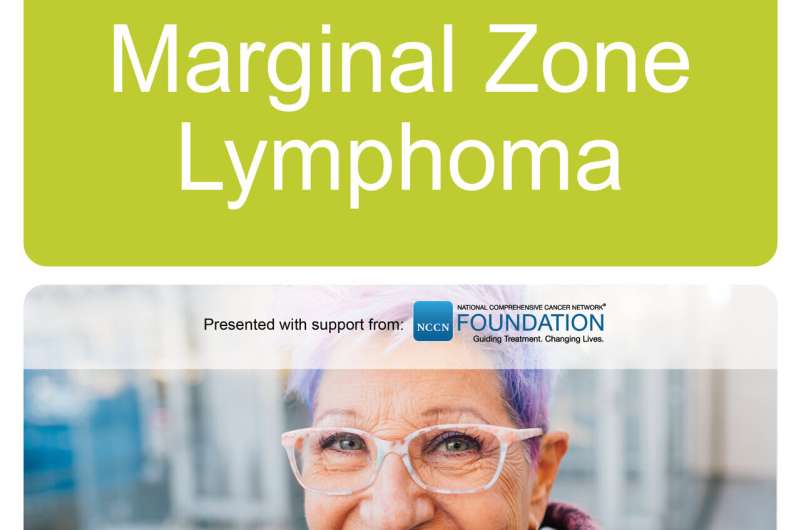New patient guidelines for marginal zone lymphoma help caregivers better understand a rare form of blood cancer

The National Comprehensive Cancer Network (NCCN) has published new NCCN Guidelines for Patients: Marginal Zone Lymphoma. A cancer of the lymphatic system, marginal zone lymphoma (MZL) is a type of non-Hodgkin B-cell lymphoma that is typically slow-growing, and comprises about 8% of non-Hodgkin lymphoma cases.
"As a result of its rarity, many people lack awareness of Marginal Zone Lymphoma. During the diagnosis phase, patients should consider the possibility of having their pathology reviewed at a medical center that sees a lot of lymphoma patients, in order to confirm the diagnosis," according to Leo I. Gordon, MD, Professor in Medicine, Northwestern University Feinberg School of Medicine and the Robert H. Lurie Comprehensive Cancer Center; Dr. Gordon is Vice-Chair of the panel that develops the NCCN Clinical Practice Guidelines in Oncology (NCCN Guidelines) for B-Cell Lymphomas, which include Marginal Zone Lymphoma.
NCCN Guidelines are the recognized standard for clinical direction and policy in cancer management; NCCN Guidelines for Patients take the same evidence-based clinical recommendations and present them in simple, easy-to-understand wording, alongside charts, images, and suggested questions to ask.
The patient guidelines for Marginal Zone Lymphoma guidelines are the latest in NCCN's library of NCCN Guidelines for Patients, published through funding from the NCCN Foundation and available online free of charge. NCCN Guidelines for Patients provide information on nearly 60 cancer types, as well as topics such as treatment side effect management, mental distress, and survivorship. With this new guide, patients can understand the distinctive features of MZL, which can be lost in discussions of slow-growing (or "indolent") lymphomas in general.
MZL develops from immune cells called B cells. That meant management for MZL was particularly impacted during the early days of the COVID-19 pandemic, since some treatment options can reduce B-cell-produced antibodies, thereby lessening the overall immune system response. Now that providers can manage COVID-19 more effectively, MZL patients are less vulnerable to poor outcomes from infection.
MZL is generally diagnosed in people in their late 50s through mid-60s, although it can occur in the skin of persons as young as 20 to 30 years of age. It is often a chronic, non-fatal disease.
There are three main subtypes of MZL based on where they originated in the body, either in the spleen, bone marrow, or in lymphatic tissues throughout the body. "MZL can be extranodal, which can involve virtually any organ in the body, including skin, stomach, lung, prostate, or breast," said Andrew D. Zelenetz, MD, Ph.D., Medical Oncologist, Memorial Sloan Kettering Cancer Center; Chair, NCCN Guidelines Panel for B-Cell Lymphomas "Splenic MZL involves the spleen, blood, and bone marrow, and is sometimes associated with hepatitis C infection. And nodal MZL primarily forms in the lymph nodes. All three subtypes are managed differently."
Treatments are trending away from cytotoxic chemotherapy and toward more targeted chemotherapy and immunotherapy, with clinical trials using chimeric antigen receptor (CAR) T-cell therapy underway.
Dr. Gordon noted that "not everyone needs treatment right away, many people can be safely observed and spared unnecessary treatment-related toxicity."
More information: Guidelines: www.nccn.org/patientresources/ … atientGuidelineId=67



















